International students from numerous partner universities spent time at Tokyo Tech in June and July 2018 to participate in the Institute's three Schools' summer programs, conducting research at laboratories and enjoying life in Japan for three months.
|
Programs |
Participating Institutes in 2018 |
1 |
Asia-Oceania Top University League on Engineering: AOTULE |
1) Tsinghua University
2) The Hong Kong University of Science and Technology
3) National Taiwan University
4) Nanyang Technological University
5) University of Malaya
6) Bandung Institute of Technology
7) Chulalongkorn University
8) Indian Institute of Technology, Madras
9) University of Moratuwa
|
2 |
Summer Exchange Research Program: SERP |
1) University of California, Santa Barbara
2) RWTH Aachen University
3) Technical University of Madrid
4) Sorbonne University (UPMC)
5) University of Warwick
6) University of Oxford
|
3 |
Asia-Oceania Strategic Universities Exchange Program: AOSU |
1) National Taiwan University of Science and Technology
2) Wuhan University of Technology
3) Singapore University of Technology and Design
|
4 |
Student Exchange Program for School of Materials and Chemical Technology |
Office National d’Etudes et Recherches Aérospatiales (ONERA) |
Tokyo Tech's School of Engineering, School of Materials and Chemical Technology, and School of Environmental and Society have unique academic exchange agreements with some of the world's leading science and engineering universities, allowing them to host and send students from and to these partner universities.
Each international student in the program joined a laboratory and conducted research supervised by a Tokyo Tech professor. Students were also eligible to take intensive Japanese language courses, participate in site-visits to prominent companies and institutions, and join various cultural and social events.
Some of these students, their Tokyo Tech counterparts, and supervising professors recently shared their reflections on the past summer.
Research activities
Pablo Marin Barbancho
1st-year master's student, Universidad Politecnica de Madrid, Spain
Summer Exchange Research Program (SERP) participant affiliated with Department of Mechanical Engineering, School of Engineering
My research field was related to fluid dynamics, more specifically, studying the interaction between viscous fingering and gravitational forces, two kinds of instabilities which appear in fluid interfaces in porous media.
The behavior of the fluids under these conditions have applications in energy techniques like carbon capture and storage (CCS) or enhanced oil recovery (EOR) which are intended to contribute to a more sustainable energy industry.
The lab activities were focused on performing several experiments between two fluids with different viscosities and densities, modifying the injection velocity of one of the fluids into the other, in order to study the behavior of the phenomenon. CT X-ray tomography was used to visualize the 3D interface, and after obtaining the images, they were processed using different image processing software. The results were later analyzed.
Comments from supervising Professor Tetsuya Suekane
I recommended Pablo engage in research proposed to us by a professor from Stanford University, who performed analytical and numerical investigations on this topic. Pablo set the stage for this research work with advice offered by professors at his home university. He successfully visualized a three-dimensional structure of viscous fingering in porous media and the interaction between gravity and hydrodynamic instability. His activity positively influenced our laboratory members.
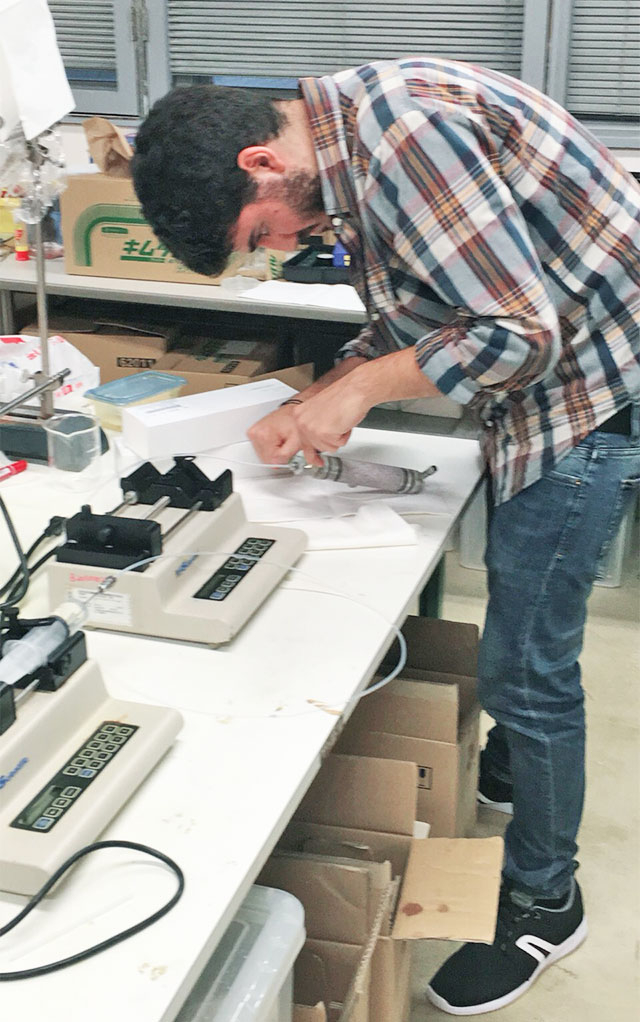
Barbancho adjusting machinery
for experiment
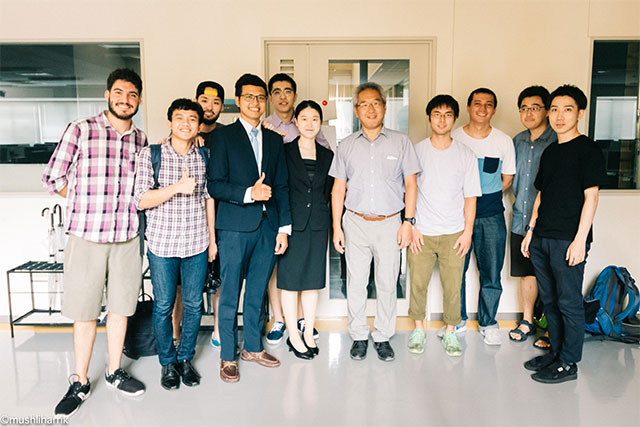
Barbancho (far left) with lab members
Survival Japanese with visit to elementary school
This course is for first-time learners of the Japanese language. Students learn the basics of Japanese grammar and vocabulary needed for conversation in everyday situations. This course also provides knowledge about Japanese culture and society.
As a practical activity incorporated into this course, the summer program students visited an elementary school to engage with local children.
Nimarshana Viraj Pemaththu Hewa
3rd-year doctoral student, University of Moratuwa, Sri Lanka
AOTULE participant affiliated with Department of Architecture and Building Engineering, School of Environment and Society
"AYUBOWAN!" ("May you live long" in Sinhalese)
My dear sons, daughters, and class teacher. Thank you very much for organizing such a wonderful welcome party for us. I also wish to thank two groups of students who guided me during the school tour on the day. You all helped me to understand the structure of Japanese elementary schools and how the education system has transformed from knowledge-based education to activity-based education in Japan.
Indeed, it was a great opportunity for me to learn Japanese calligraphy from students. They are so humble and show their enthusiasm in teaching. This is the first time, I learned "the exact way of writing a few letters of the Japanese alphabet." When I go back to my country, I'll take all the paints and name card to share with my parents, teachers, and friends and to display on my wall.
I had a great opportunity to have lunch with wonderful juniors. I learned a lot from you. I especially thank the girl and two boys who spent such a nice time helping and guiding me in all activities. Further, I need to highlight that the event was well organized by the class teacher and students along with the school administrators.
Finally, thank you for making me one of your important guests during our visit and for making June 3, 2018 a truly remarkable day in my life. My dear little stars, you are the future of wonderful Japan; you are the future of this world. I wish you all the very best in your future endeavors!
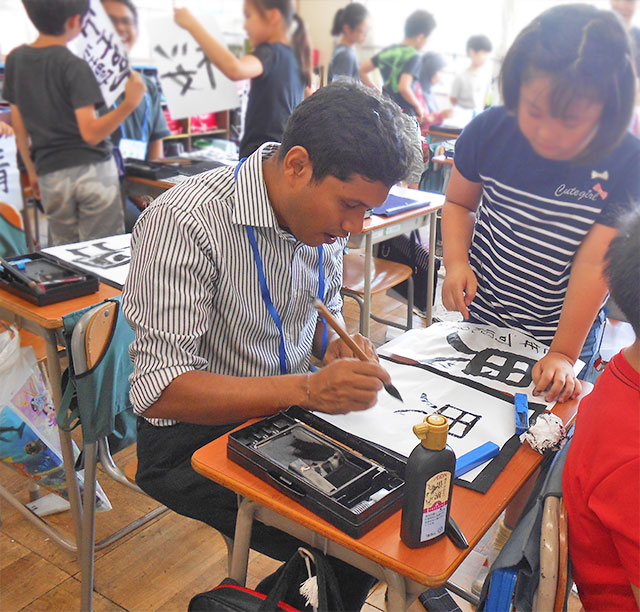
Viraj trying Japanese calligraphy
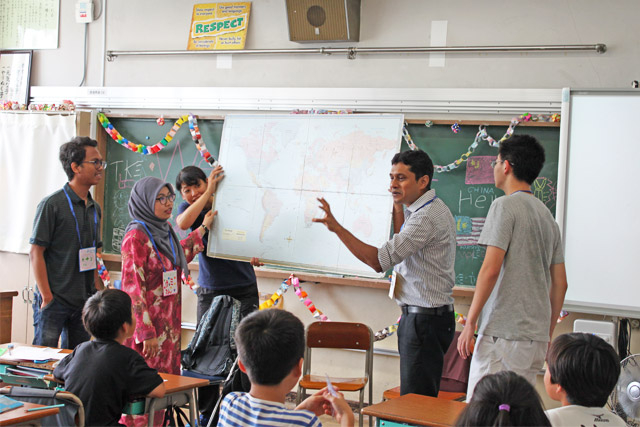
Viraj (second from right) introducing his home country of Sri Lanka
HighTech Japan site visit
In this course, students visit Japanese companies or research institutes specializing in various fields. Through lectures by specialists and on-site visits, the students get an overview of the advanced technologies developed in Japan and study the applications of the technology in manufacturing. In the summer of 2018, students visited Tokyo Gas Ltd. Ohgishima LNG Terminal, JFE Steel Corporation, Railway Technical Research Institute, and NHK Science & Technology Research Laboratories.
Yong Zen Tan
4th-year doctoral student at Nanyang Technological University, Singapore
AOTULE participant affiliated with Department of Materials Science and Engineering, School of Materials and Chemical Technology
The Railway Technical Research Institute (RTRI) changed my opinion on railway research. It could have been more relevant in Japan due to the need to build earthquake-resistant structures as well as trains, to reduce or better yet prevent the loss of lives or major disruptions of transportation services. However, after looking at the different considerations RTRI made, I realized the research extends far beyond building up resistance to earthquakes, but also into passenger experience and convenience.
I personally feel the transportation system of a country is the heart of a productive society and it is a measure of how efficient the country's work force is, as less time spent on travelling equates to more time spent on doing important work. Hence, Japan's highly efficient society is embodied in its world-class railway transportation network.
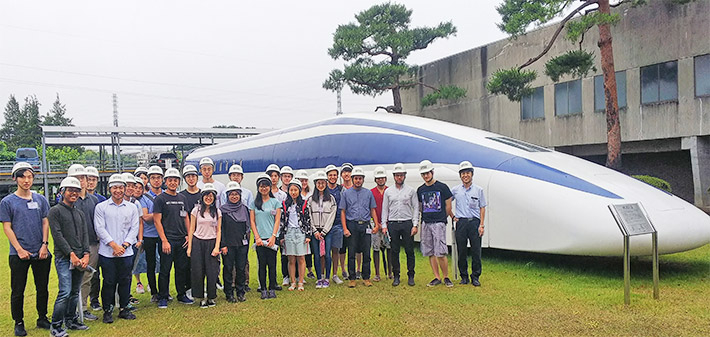
At Railway Technical Research Institute
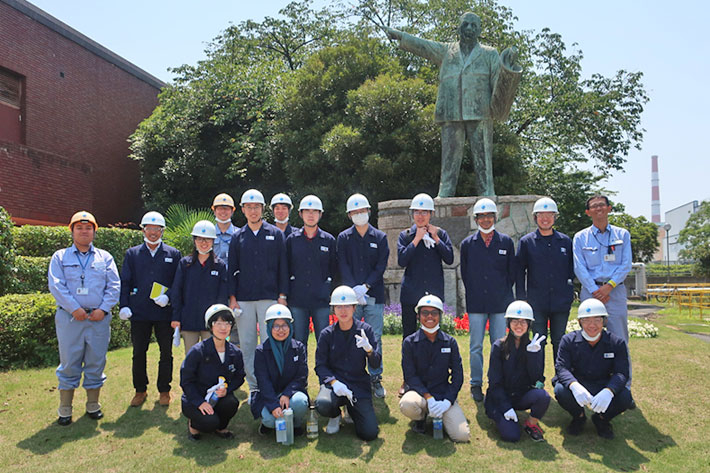
At JFE Steel Corporation, Chiba Steel Works
Multidisciplinary International Student Workshop (MISW) 2018
MISW 2018 was held on August 7 and 8 for the AOTULE summer students and engineering graduate students to encourage innovation across disciplines via a research-based workshop and promote cross-cultural understanding.
Participants presented their own research or a related topic in either oral or poster presentation format at the workshop. To encourage high-quality presentations, all efforts are evaluated, with the best ones receiving awards. The best presenters from approximately 20 Tokyo Tech graduate students were selected to attend the AOTULE Student Workshop, which will be held at Indian Institute of Technology Madras (IITM) from November 21 to 24, 2018.
Parts of the program were changed or postponed because typhoon Shanshan was approaching. However, participating students spent a productive time fully demonstrating their research presentation and exchanging views. This time, Dr. Yuya Nakamura, president and CEO of Axelspace Corporation, was welcomed to give a plenary lecture about microsatellite venture projects jointly operated by the University of Tokyo and Tokyo Tech.
Guang Yang
4th-year bachelor student, Tsinghua University, China
AOTULE participant affiliated with Department of Mechanical Engineering, School of Engineering
As an undergraduate student, it was my first time to participate in an international conference or workshop, and it was a great honor for me personally. During the 10th MISW, I was deeply impressed by the research done in Tokyo Tech. Although I was not very familiar with many topics since this was a multidisciplinary workshop, I was able to tell that many works presented were accomplished with great effort. Not only did I learn the cutting-edge research topics in different engineering areas, but also how to present research work.
During the 10th MISW, I gave an oral presentation. It was a precious opportunity for an undergraduate student to share ideas with other fellow researchers, and I enjoyed it a lot. Since it was my first oral presentation, I was quite nervous and made mistakes, particularly in time management. However, I was able to learn from other more experienced presenters. Many presenters produced great presentations which not only showed their work but also told us a wonderful story, from background to prospect, and method to result. I am sure that I will be able to use some of the skills in my future presentations.
The time for oral presentations was quite short for explaining the background and method in detail, which I thought was a pity. More detailed material in advance would have been helpful. As a result, there were few people asking questions. Unfortunately, because of the typhoon, the group work, which I was quite looking forward to, was also cancelled.
In conclusion, I think the workshop was a precious experience which I appreciate very much. I hope more students can join this workshop and learn from others as I did.
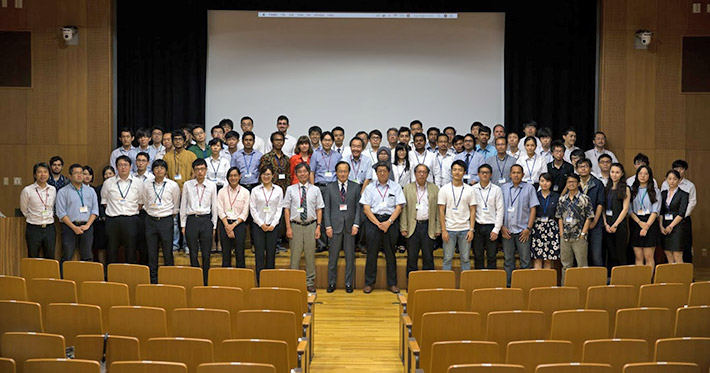
Workshop group photo
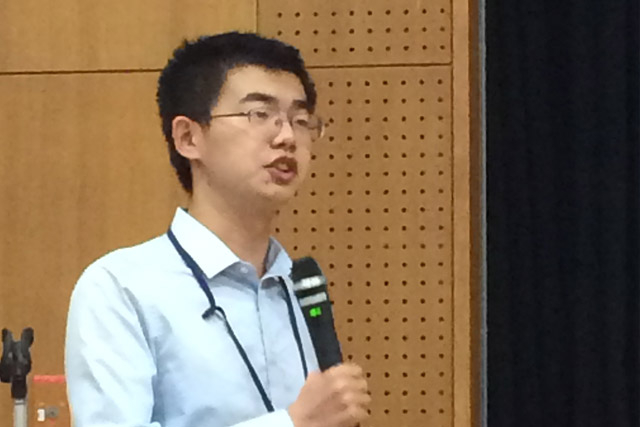
Yang's presentation
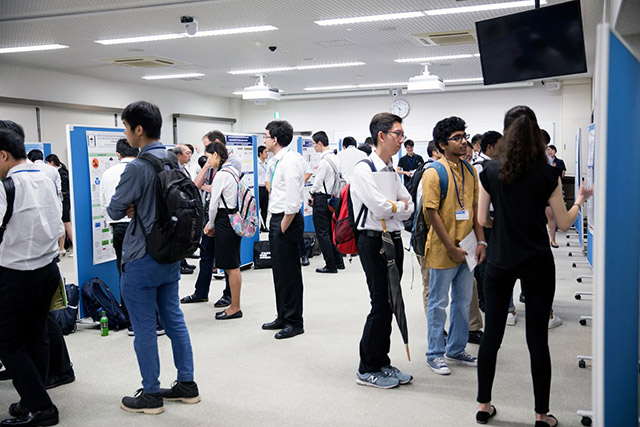
Poster session during workshop
Japanese culture experience: Flower arrangement and tea ceremony
In cooperation with the Meguro International Friendship Association (MIFA), a flower arrangement and tea ceremony workshop took place as part of the hands-on cultural experience at Meguro City Office on July 9, 2018. Participants acquired basic knowledge and the spirit of hospitality, along with skills in the two arts.
Anton Joseph
1st-year master's student, RWTH Aachen University, Germany
SERP participant affiliated with Department of Chemical Science and Engineering, School of Materials and Chemical Technology
I want to express my sincerest thanks to Soma-sensei for showing and explaining these wonderful Japanese traditions to me. It was a very welcome relaxation from the usual workday and I'm very happy that I will be able to leave Japan having experienced such an important part of Japanese culture. I hope that I will have the opportunity to practice ikebana in Germany, because I was amazed by the beauty one can create by using so few flowers.
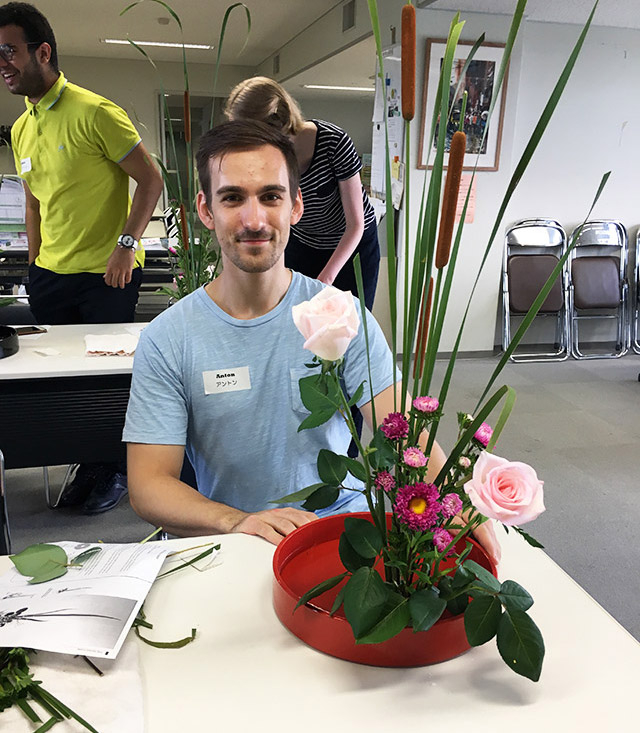
Joseph and his work
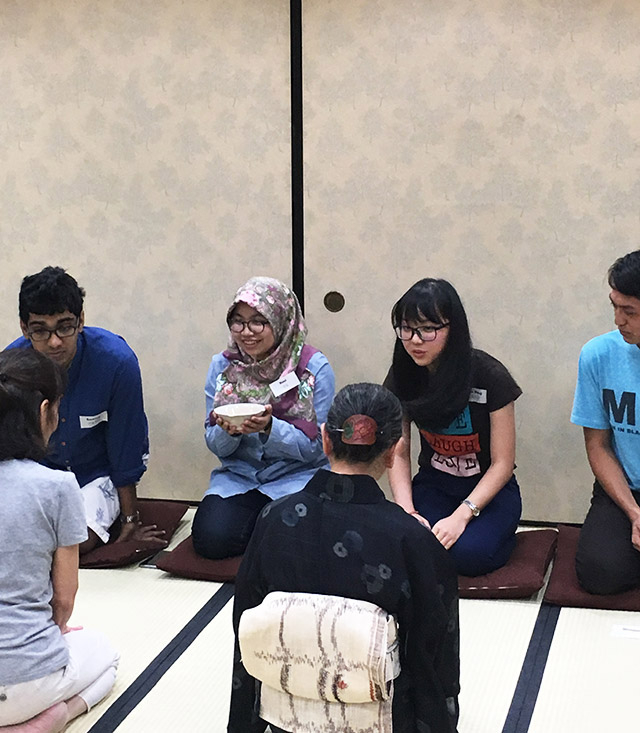
Tea ceremony
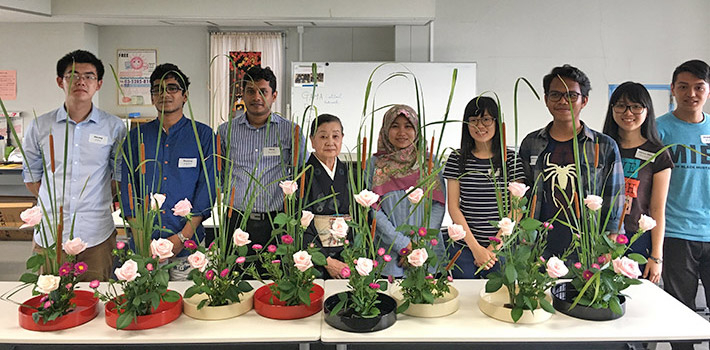
With Grandmaster Takako Soma (fourth from left)
Campus tour
Another characteristic of Tokyo Tech is the planning and execution of various networking events between its inbound and outbound exchange students. To get this year's participants acclimatized, Tokyo Tech students who studied at a partner university in the past, or plan to do so later this year, organized campus tours.
Michika Takahashi
2nd-year master's student, Department of Materials Science and Engineering, School of Materials and Chemical Technology
Outbound program participant at University of Genoa, Italy (November 2017 to February 2018)
During the campus tour, I explained how to use Tokyo Tech facilities such as the cafeteria and gym in English. The international students seemed most interested in the swimming pool and gym. After the tour, we enjoyed lunch at the cafeteria together.
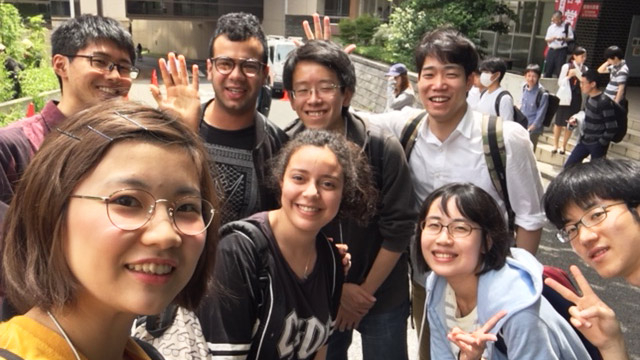
Campus tour organized by outbound program
student Takahashi (front left)
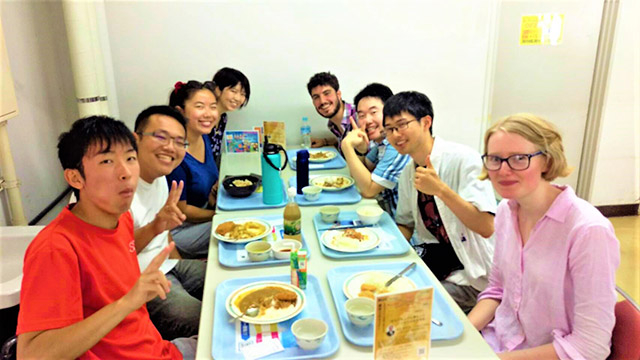
SERP inbound students, Tokyo Tech outbound students,
peer tutors enjoying lunch
Farewell and welcoming parties
Each of the summer programs hold farewell and welcoming parties. This year, participants enjoyed introducing their home countries and universities, socializing with Tokyo Tech students, and joining events representative of Japan's summer season.
Sayaka Tezuka
1st-year master's student, Department of Materials Science and Engineering, School of Materials and Chemical Technology
Outbound program participant at Max Planck Institute, Germany (August to November 2018)
The international students I talked with at the party were all friendly and our conversation got quite lively on a variety of issues. I was able to talk with students who came to Tokyo Tech because they want to engage in research fields in which Japan leads the world, and who are considering working in the country in the future. We also discussed our research topics, differences in campus life between our home countries, and how the visiting students are enjoying their stay in Japan.
I will be conducting research in Germany for three months soon, where I would like to not only be actively involved with those around me and improve my English ability, but also gain knowledge and experiences that I would never obtain in my daily life as a researcher in Japan.
I hope this trend of exchange with international students continues to expand.
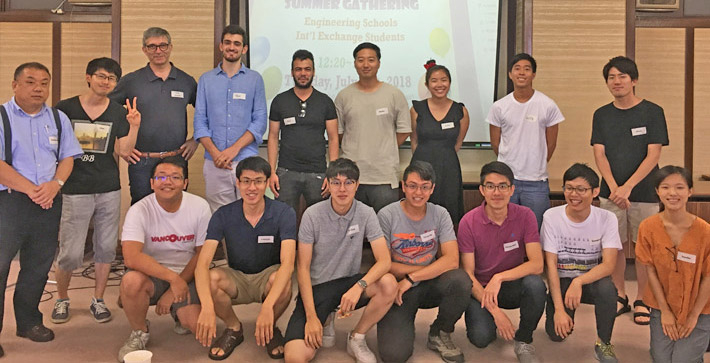
Tezuka (front right) at summer gathering with SERP, AOSU, and Tokyo Tech's outbound students
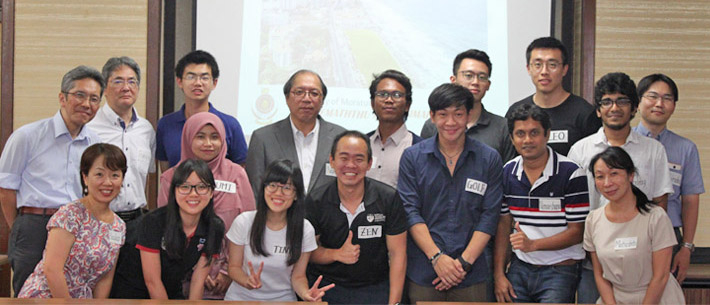
Farewell party with AOTULE students, host supervisors, and program committee members
. Any information published on this site will be valid in relation to Science Tokyo.





















